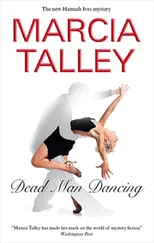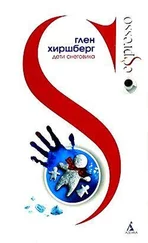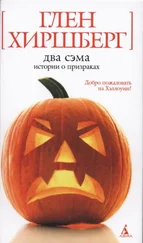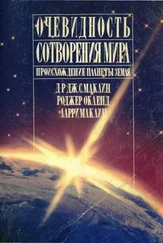Глен Хиршберг - Dancing Men
Здесь есть возможность читать онлайн «Глен Хиршберг - Dancing Men» весь текст электронной книги совершенно бесплатно (целиком полную версию без сокращений). В некоторых случаях можно слушать аудио, скачать через торрент в формате fb2 и присутствует краткое содержание. Жанр: short_story, на английском языке. Описание произведения, (предисловие) а так же отзывы посетителей доступны на портале библиотеки ЛибКат.
- Название:Dancing Men
- Автор:
- Жанр:
- Год:неизвестен
- ISBN:нет данных
- Рейтинг книги:4 / 5. Голосов: 1
-
Избранное:Добавить в избранное
- Отзывы:
-
Ваша оценка:
- 80
- 1
- 2
- 3
- 4
- 5
Dancing Men: краткое содержание, описание и аннотация
Предлагаем к чтению аннотацию, описание, краткое содержание или предисловие (зависит от того, что написал сам автор книги «Dancing Men»). Если вы не нашли необходимую информацию о книге — напишите в комментариях, мы постараемся отыскать её.
Dancing Men — читать онлайн бесплатно полную книгу (весь текст) целиком
Ниже представлен текст книги, разбитый по страницам. Система сохранения места последней прочитанной страницы, позволяет с удобством читать онлайн бесплатно книгу «Dancing Men», без необходимости каждый раз заново искать на чём Вы остановились. Поставьте закладку, и сможете в любой момент перейти на страницу, на которой закончили чтение.
Интервал:
Закладка:
“Listen. Two girls. The same ones, over and over. That’s what. the gypsy. whittled.”
Dimly, in the part of my brain that still felt alert, I wondered how anyone could tell if two figures carved in God knows what with the sharpened edge of a button were the same girls.
But my grandfather just nodded. “Even at the end. Even at Chelmno. In the woods. In the rare moments. when we weren’t digging, and the rest of us. sat. He went straight for the trees. Put his hands on them like they were warm. Wept. First time, all war. Despite everything we saw, everything we knew. no tears from him, until then. When he came back, he had . strips of pine bark in his hands. And while everyone else slept. or froze. or died. he worked. All night. Under the trees.
“Every few hours. shipments came. Of people, you understand? Jews. We heard trains. Then, later, we saw creatures. between tree trunks. Thin. Awful. Tike dead saplings walking. When the Nazis. began shooting. they fell with no sound. Pop-pop-pop from the guns. Then silence. Things lying in leaves. In the wet.
“The killing wasn’t. enough fun. for the Nazis, of course. They made us roll bodies. into the pits, with our hands. Then bury them. With our hands. Or our mouths. Sometimes our mouths. Dirt and blood. Bits of person in your teeth. A few of us lay down. Died on the ground. The Nazis didn’t have … to tell us. What to do with them. We just. pushed anything dead. into the nearest pit. No prayers. No last look to see who it was. It was no one. Do you see? No one. Burying. Or buried. No difference.
“And still, all night, the gypsy whittled.
“For the dawn. shipment . the Nazis tried. something new. Stripped the newcomers. then lined them up… on the lip of a pit. twenty, thirty at a time. Then they played. perforation games. Shoot up the body. down it. see if you could get it. to flap apart. before it fell. Open up, like a flower.
“All through the next day. All the next night. Digging. Waiting. Whittling. Killing. Burying. Over and over. Sometime. late second day, maybe. I got angry. Not at the Nazis. For what? Being angry at human beings. for killing. for cruelty. like being mad at ice, for freezing. It’s just. what to expect. So I got angry. at the trees. For standing there. For being green, and alive. For not falling when bullets hit them.
“I started. screaming. Trying to. In Hebrew. In Polish. The Nazis looked up, and I thought they would shoot me. They laughed instead. One began to clap. A rhythm. See?”
Somehow, my grandfather lifted his limp hands from the arms of the wheelchair and brought them together. They met with a sort of crackle, like dry twigs crunching.
“The gypsy. just watched. Still weeping. But also. after a while. nodding.”
All this time, my grandfather’s eyes had seemed to swell, as though there were too much air being pumped into his body. But now, the air went out of him in a rush, and the eyes went dark, and the lids came down. I thought maybe he’d fallen asleep again, the way he had last night. But I still couldn’t move. Dimly, I realized that the sweat from my long day’s walking had cooled on my skin, and that I was freezing.
My grandfather’s lids opened, just a little. He seemed to be peering at me from inside a trunk, or a coffin.
“ I don’t know how the gypsy knew. that it was ending. That it was time. Maybe just because. it had been hours. half a day. between shipments. The world had gone. quiet. Us. Nazis. Trees. Corpses. There had been worse places. 1 thought. to stop living. Despite the smell.
“Probably, I was sleeping. I must have been, because the gypsy shook me. by the shoulder. Then held out. what he’d made. He had it. balanced. on a stick he’d bent. So the carving moved. Back and forth. Up and down.”
My mouth opened and then hung there. I was rock, sand, and the air moved through me and left me nothing.
“Life,’ the gypsy said to me, in Polish. Only Polish I ever heard him speak. ‘Life. You see?’
“I shook. my head. He said it again. ‘Life.’ And then. I don’t know how. but 1 did. see.
“I asked him. ‘Why not you?’ He took. from his pocket. one of his old carvings. The two girls. Holding hands. I hadn’t noticed. the hands before. And I understood.
“‘My girls,’ he said. ‘Smoke. No more. Five years ago.’ I understood that, too.
“I took the carving from him. We waited. We slept, side by side. One last time. Then the Nazis came.
“They made us stand. Hardly any of them, now. The rest gone. Fifteen of us. Maybe less. They said something. German. None of us knew German. But to me. at least. the word meant. run.
“The gypsy. just stood there. Died where he was. Under the trees. The rest. I don’t know. The Nazi who caught me. laughing. a boy. Not much. older than you. Laughing. Awkward with his gun. Too big for him. I looked at my hand. Holding. the carving. The wooden man. ‘Life,’ I found myself chanting. instead of Shma. ‘Life.’ Then the Nazi shot me in the head. Bang.”
And with that single word, my grandfather clicked off, as though a switch had been thrown. He slumped in his chair. My paralysis lasted a few more seconds, and then I started waving my hands in front of me, as if I could ward off what he’d told me, and I was so busy doing that that I didn’t notice, at first, the way my grandfather’s torso heaved and rattled. Whimpering, I lowered my hands, but by then, my grandfather wasn’t heaving anymore, and he’d slumped forward further, and nothing on him was moving.
“Lucy!” I screamed, but she was already out of the house wrestling my grandfather out of his chair to the ground. Her head dove down on my grandfather’s as she shoved the mask up his face, but before their mouths even met, my grandfather coughed, and Lucy fell back, sobbing, tugging the mask back into place.
My grandfather lay where he’d been thrown, a scatter of bones in the dirt. He didn’t open his eyes. The oxygen tank hissed, and the blue tube stretching to his mask filled with wet mist.
“How?” I whispered
Lucy swept tears from her eyes. “What?”
“He said he got shot in the head.” And even as I said that, I felt it for the first time, that cold slithering up my intestines into my stomach, then my throat.
“Stop it,” I said. But Lucy slid forward so that her knees were under my grandfather’s head and ignored me. Overhead, I saw the moon half-embedded in the ridged black of the sky like the lidded eye of a Gila monster. I stumbled around the side of the house and, without thinking about it, slipped into the hogan.
Once inside, I jerked the curtain down to block out the sight of Lucy and my grandfather and that moon, then drew my knees tight against my chest to pin that freezing feeling where it was. I stayed that way a long while, but whenever I closed my eyes, I saw people splitting open like peeled bananas, limbs strewn across bare, black ground like tree branches after a lightning storm, pits full of naked dead people.
I’d wished him dead, I realized. At the moment he tumbled forward in his chair, I’d hoped he was dead. And for what, exactly? For being in the camps? For telling me about it? For getting sick, and making me confront it?
But with astonishing, disturbing speed, the guilt over those thoughts passed. And when it was gone, I realized that the cold had seeped down my legs and up to my neck. It clogged my ears, coated my tongue like a paste, sealing the world out. All I could hear was my grandfather’s voice like blown sand against the inside of my skull. Life. He was inside me, I thought. He had erased me, taken my place. He was becoming me.
Читать дальшеИнтервал:
Закладка:
Похожие книги на «Dancing Men»
Представляем Вашему вниманию похожие книги на «Dancing Men» списком для выбора. Мы отобрали схожую по названию и смыслу литературу в надежде предоставить читателям больше вариантов отыскать новые, интересные, ещё непрочитанные произведения.
Обсуждение, отзывы о книге «Dancing Men» и просто собственные мнения читателей. Оставьте ваши комментарии, напишите, что Вы думаете о произведении, его смысле или главных героях. Укажите что конкретно понравилось, а что нет, и почему Вы так считаете.







